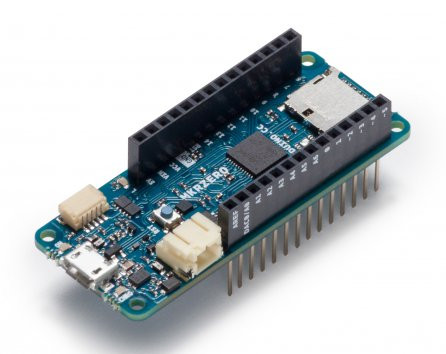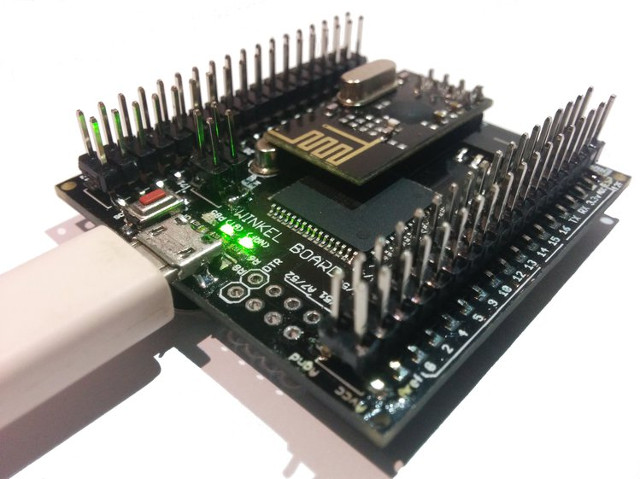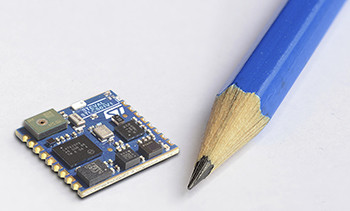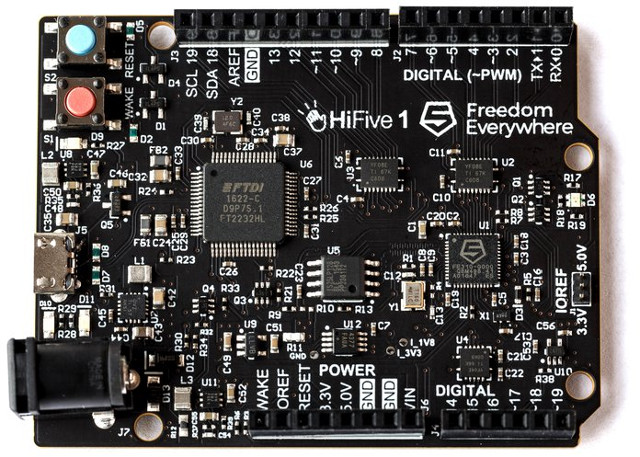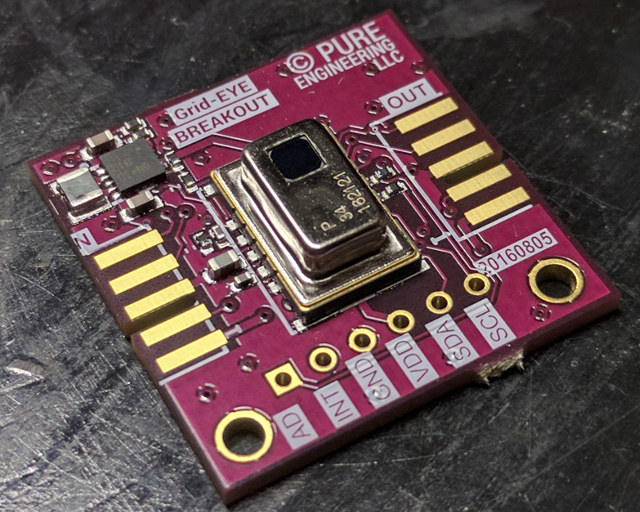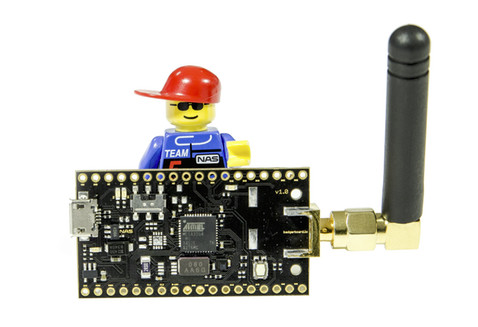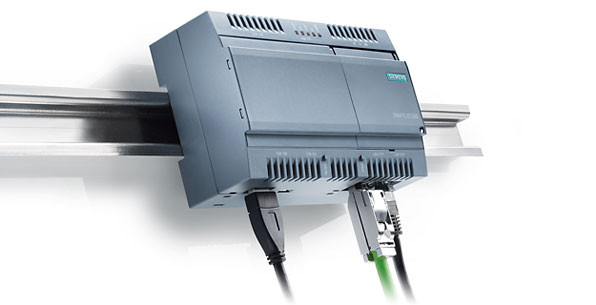Arduino Zero was unveiled over two years ago with an Atmel SAMD21G18 ARM Cortex M0+ MCU in Arduino Uno Rev.3 form factor, the company has now launched Arduino MKRZero with the same MCU but using the much smaller Arduino MKR1000 form factor. Arduino MKRZero specifications: MCU – Atmel/Microchip SAMD21 32-bit ARM Cortex M0+ MCU @ 48 MHz with 32 KB SRAM, 256 KB flash (8KB for bootloader) External Storage – micro SD slot Digital I/O Pins – 22x GPIOs with 12x PWM, UART, SPI, and I2C, 8x external interrupts Analog Pins – 7x analog inputs (8/10/12-bit ADC), and 1x analog output (10-bit DAC) DC Current per I/O Pin – 7 mA USB – 1x micro USB port for power and programming Debugging – USB via Atmel’s Embedded Debugger (EDBG) on-board debugger, and JTAG Misc – reset button, 1x LED (pin 32), 32.768 kHz RTC Power 5V via micro USB port […]
$24 Winkel Arduino Compatible Board Includes WiFi, Bluetooth, 2.4 GHz RF, and an RTC (Crowdfunding)
There are plenty of Arduino compatible boards with WiFi based on ESP8266 WiSoC going for around $5 to $10, and with ESP32 processor, we are starting to have $15 to $20 boards with both WiFi and Bluetooth, but while ESP-IDF SDK has been progressing nicely, some parts of Bluetooth functionality are still not implemented. Winkel board offers an interesting alternative by offering WiFi, Bluetooth, 2.4GHz ISM, and an RTC for $24. Winkel board specifications: MCU – Microchip/Atmel ATmega128 MCU @ 16 MHz with 128KB flash memory, 4KB SRAM, 4KB EEPROM Connectivity WiFi 802.11 b/g/n via ESP12E module based on ESP8266 Bluetooth 2.0 + EDR via HC-05 module RF Radio – NRF24l01 2.4 GHz ISM radio. (Note: It might be possible to use it for Bluetooth LE connection, see here and there). I/Os (through both Atmel MCU and ESP8266) 38x Digital I/Os 7x PWM Digital I/Os 8x Analog Inputs USB – […]
Sonoff SC WiFi Environmental Monitor Sells for $20
ITEAD Studio has done some good job with their Sonoff home automation devices based on Espressif ESP8266 WiSoC, as they are affordable, working as advertised with default firmware, and hackable with our own. The company has now added a new model, which may or may not be as useful, with Sonoff SC environmental monitor device that detects current temperature, humidity, light intensity, air quality, and sound levels, and sends the data to eWeLink app installed on your Android or iOS phone. You may be thinking it can be used as a home assistant since it really looks like a speaker and include some sort of microphone, but the top of the device is probably used to let air and dust go through. Sonoff SC specifications: WiSoc – Espressif ESP8266 Tensilica L106 processor @ 80/160 Mhz with WiFi MCU – Atmel ATMega328 MCU Connectivity – 802.11 b/g/n WiFi Sensors Sharp GP2Y1010AU0F dust sensor […]
STMicro SensorTile is a Tiny STM32 Module with Bluetooth 4.1 LE and Four Sensor Chips
STMicroelectronics SensorTile is a 13.5 x 13.5mm sensor board based on STM32L4 ARM Cortex-M4 microcontroller, a MEMS accelerometer, gyroscope, magnetometer, pressure sensor, a MEMS microphone, as well as a 2.4Ghz radio chip for Bluetooth 4.1 Low Energy connectivity for wearables, smart home, and IoT projects. SensorTile hardware specifications: MCU – STMicro STM32L476 ARM Cortex-M4 microcontroller@ up to 80 MHz with 128 KB RAM, 1MB flash Connectivity – Bluetooth 4.1 Smart/LE via BlueNRG-MS network processor with integrated 2.4GHz radio compliant with Sensors LSM6DSM 3D accelerometer + 3D gyroscope LSM303AGR 3D Magnetometer + 3D accelerometer LPS22HB pressure sensor/barometer MP34DT04 digital MEMS microphone I/Os – 2x 9 half holes with access to UART, SPI, SAI (Serial Audio Interface), I2C, DFSDM, USB, OTG, ADC, and GPIOs signals Debugging – SWD interface (multiplexed with GPIOs) Power Supply Range – 2V to 5.5 V Dimensions – 13.5 x 13.5 mm Software development can be done through […]
$59 HiFive1 Arduino Compatible Board is Powered by Sifive Open Source RISC-V MCU (Crowdfunding)
Royalty-free RISC-V instruction sets has been getting in the news in the last few years with various MMU designs from companies or projects like lowRISC, PULPino, and SiFive, and recently there are been rumors that Samsung may use RISC-V in their future IoT SoCs. Many projects are still in progress, and while you can get involved in OnChip Open-V MCU crowdfunding campaign to their get the MCU or a development board, the cost for the MCU ($49) and development board ($99) is a little on the high side, and delivery is expected in 2018 for most rewards. SiFive appears to have a more interesting open source RISC-V solution with HiFive1 Arduino compatible board going for $59 and slated to ship between December 2016 and February 2017. HiFive1 development board specifications: MCU – SiFive Freedom E310 (FE310) 32-bit RV32IMAC processor @ up to 320+ MHz (1.61 DMIPS/MHz) Storage – 128 Mbit […]
Grid-EYE Breakout Board is a $49 Low Resolution Thermal Camera Module
Thermal cameras can be really expensive pieces of equipment, and even the cheap 60×60 thermal cameras available on Aliexpress costs a little over $200. However, PURE Engineering has made an breakout board with Panasonic Grid-EYE infrared 8×8 array sensor that allows you to experiment with the technology, or integrate into your own projects for just $49. Grid-EYE breakout board features: Panasonic Grid-EYE AMG8834 64 pixel infrared / thermal camera sensor with 60 degree viewing angle using MEMS thermopile technology Pinout compatible with Arduino Zero, ST-NUCLEO board, and other 3.3V boards with I2C, VDD, GND, INT, and AD pins PUREModules PCB edge connectors with UART, GPIO, to interface with the company’s IoT board Power Supply – On-board regulator handles 3 to 5V input The Panasonic sensor transfers thermal presence, direction, and temperature values over I2C. The company wrote a demo for the module with an Arduino sketech and a Processing sketch […]
Badgerboard Arduino Compatible LoRa Board Goes for $43 and Up (Crowdfunding)
Here comes one more LoRa board to play with. Badgerboard combines an Arduino compatible Atmel/Microchip AVR MCU with a Microchip RN2483 or RN2903 module in a breadboard compatible board powered via micro USB port or an external battery. Badgerboard specifications: MCU – Atmel ATmega32U4 MCU Connectivity – LoRaWAN via Microchip RN2483 (EU – 868MHz) / RN2903 (US – 915 MHz) modem with SMA connector and antenna USB – 1x micro USB port for power and programming Expansion – 2x 18-pin unpopulated headers with SPI, I2C, 13x GPIOs, 6x 10-bit ADC, 3.3V and GND signals; open drain output for relays up to 24V 100 mA Sensors – STM HTS221 temperature and humidity sensor Misc – Reset button; user and Tx/Rx LEDs; power on/off switch Power Supply – 5V via micro USB port, or Li-Ion/ Li-Po battery via JST connector Dimensions – 56 x 26 mm The board can be programmed with […]
Siemens SIMATIC IOT2000 UL Approved Educational & Industrial IoT Gateways are Powered by Intel Quark Processor
Siemens has recently released SIMATIC IOT2000 series IoT gateways based on Intel Quark X1000/X1020 processor also used in Intel Galileo Gen 2 board with both IOT2020 educational version, and IOT2040 industrial version featuring UL-approval, Arduino headers, and a mini PCIe expansion socket. SIMATIC IOT2040 specifications: SoC – Intel Quark X1020 32-bit processor @ up to 400 MHz with 16KB cache (2.2W TDP) System Memory – 1 GB RAM Storage – micro SD slot Connectivity – 2x Ethernet ports Serial – 2x RS232/485 interfaces USB – 1x USB 2.0 port, 1x micro USB device port Expansion – Arduino UNO compatible headers, mini PCIe socket Misc – Battery-backed RTC Power Supply – 9 to 36V DC wide-range power supply Dimensions – 144x90x54 mm Weight – About 200 grams Temperature Range – 0 °C to up to +50 °C Certificates – CE, UL, FCC, KCC, RCM The device support wall-mount and DIN rail […]


